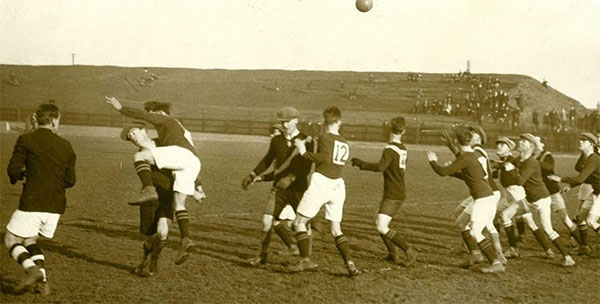100 YEARS AGO: ‘Gaelic Sunday’, 4 August 1918
Published in Issue 4 (July/August 2018), Volume 26By Joseph E.A. Connell Jr
During the 1916 Rising, many Gaelic Athletic Association members fought with the rebels. The GAA subsequently became increasingly militant. The Association often held meetings in a hall at 68 Sackville Street Upper (now O’Connell Street). Dublin Castle held this to be the ‘Central Council of the GAA’ prior to the Rising and throughout the War of Independence.

Above: On 4 August 1918 the GAA staged c. 1,500 hurling or football matches throughout the country in defiance of a Dublin Castle ban on what became known as ‘Gaelic Sunday’. (GAA Museum)
In July 1918 the British government declared the GAA a ‘dangerous organisation’ and Gaelic games were banned. The British authorities informed the GAA that no hurling or football games would be allowed unless a permit was obtained from Dublin Castle. On 20 July 1918, the GAA held a meeting in the Sackville Street rooms in response to the Dublin Castle edict. Those at the meeting unanimously agreed that no such permit should be applied for under any conditions and instead defiantly organised a series of matches throughout the country. After a short discussion, it was decided that
‘… no permits would be asked for under any conditions; and provisional councils, county committees, leagues and clubs were to be notified accordingly; and also that no member was to participate in any competition if any permit had already been obtained’.
It was further decided ‘to arrange for Sunday, 4 August, at 3 pm, a series of matches throughout each county to be localised as much as possible’. The GAA organised a game in every parish, and on 4 August 1918 around 1,500 hurling or football matches were held throughout the country on what became known as ‘Gaelic Sunday’.
In Dublin, matches were played at Croke Park, Phoenix Park, Ringsend, Clondalkin, Sandymount, Baldoyle, Fox & Geese, Crumlin, Balneary, Clonsilla, Terenure, Church Road and Bray. In all, there were 22 football and two hurling matches in Dublin. In Kildare, the Kildare County Board threatened to suspend any club that did not field a team and seventeen matches were played in the county. ‘Some forty matches were arranged under the auspices of Cork Co. Board for the city and county, but rain fell so heavily during the afternoon and evening that in Cork City and district the matches had to be abandoned.’
The Freeman’s Journal reported on 5 August 1918:
‘Gaelic Sunday, organised by the Gaelic Athletic Association, was observed throughout the country yesterday with great success. Every football and hurling team in the country took part in a match, and in all some 54,000 players were engaged. As a result of the withdrawal of the prohibition against Gaelic games enforced for the past couple of weeks by police and military, there was no interference with the matches, which were carried out with perfect order in the presence of large numbers of spectators. Every town and district had its own venue, and all the matches started simultaneously at three o’clock (old time). The progress of the play was everywhere followed with enthusiasm, and the occasion provided a unique display of the popularity of the Gaelic games. The proceedings of the day, the good order among the crowds, the perfection of organisation, and the magnificent response made by every team and club throughout the country, constituted at once a vindication of the Gaelic Athletic Association and its objects, and a demonstration of the popular hold which the Gaelic games have on the interest and sympathy of the Irish people.’
Matches were openly played throughout the country by almost every club, and men and women long retired from playing or who had never been seen with a hurley walked around rebelliously carrying one.
‘Gaelic Sunday’ was seen as a response to the Castle ban and other harassments, such as stopping players travelling to games and damaging club facilities. Large crowds witnessed the play at all the centres. No police were present and there was no interference with the matches.
Joseph E.A. Connell is the author of Michael Collins: Dublin 1916–22 (Wordwell Books).
















